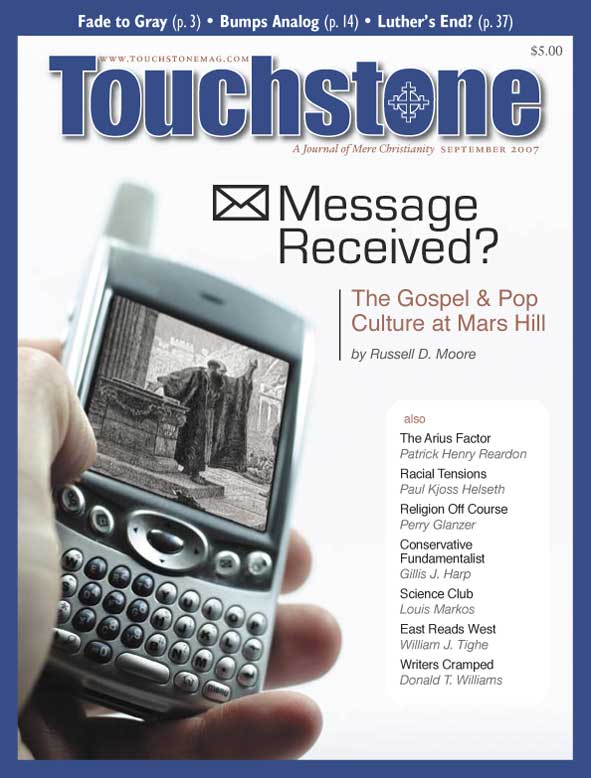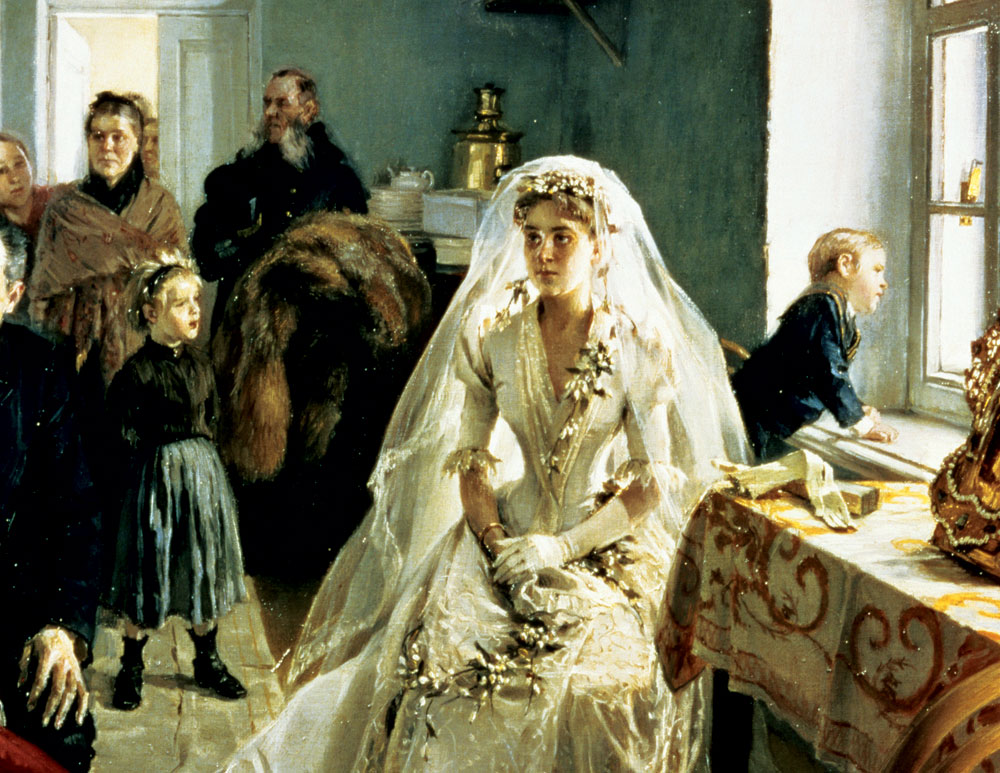Conservative Fundamentals
The Essential Russell Kirk: Selected Essays
edited by George A. Panichas
ISI Books, 2007
(640 pages, $20.00, paperback)
reviewed by Gillis J. Harp
In an insightful essay in the Wilson Quarterly a couple summers ago, historian Michael Kazin remarked that in conservatism today, “an aggressive populism that rails against a liberal elite in the name of the patriotic, God-fearing masses has all but replaced the earlier conservatism characterized by the defense of social hierarchy, respect for state authority, and an aversion to heated rhetoric and the rapid social changes it seeks to inspire.”
Sadly, the public voice of the conservative movement has taken on many of the features of the radical left. It is anti-intellectual, uncivil, and lacks any historical consciousness, even an understanding of its own origins. As Kazin put it: “Edmund Burke and John Adams might be amused by the likes of Ann Coulter and Rush Limbaugh, but those bewigged gentlemen would also recognize that such provocateurs have, in effect, rejected the philosophical tradition they cherished.”
The essays of Russell Kirk are a welcome corrective.
The editor, George A. Panichas, a conservative literary critic and editor of Modern Age (a quarterly founded by Kirk in 1957), helpfully organizes this collection under nine thematic headings (including “The Idea of Conservatism,” “Principles of Order,” “The MoralImagination,” and “The Drug of Ideology”). He also provides thoughtful introductions both for these sections and for each essay, as well as a detailed chronology of Kirk’s life and a bibliography.
Like all Kirk’s writings, these essays are steeped in the Great Conversation of the West, informed by serious historical reflection, charitable in tone (though sometimes pointed in their criticism of reigning liberal orthodoxies), constructive, and often refreshingly hopeful.
Kirk’s Conversation
Kirk maintained that genuine conservatism opposes any sort of ideology. What conservatives have sought to conserve in different places and times has naturally differed, and thus they should demure from any sort of universal program.
Still, conservatism has alwaysreflected at least “six general principles” outlined by Kirk in the volume’s opening essay: belief in “a transcendent moral order”; society viewed as “a community of souls” stretching back into the primordial past; deference to “the wisdom of our ancestors”; a measured prudence in considering any political change; acceptance of class differences coupled with the cherishing of private property; and, finally, recognition of human imperfectability and thus the natural limits of social reform.
The last was, of course, drawn from a Christian understanding of human sin and moral imperfection. Moreover, although Kirk cherished individual liberty, he invariably stressed the need for order as the primary social need.
As the editor aptly summarizes his position: “Order is especially prominent among the first principles that Kirk sees as central to the health of the community and of the human soul. . . . In his exposition of the need for order, Kirk is a twentieth-century successor” to thinkers such as Edmund Burke and Alexis de Tocqueville.
It is impossible in this short review to do justice to such a lengthy and varied collection of essays. Among my favorites is Kirk’s sharply worded critique of libertarianism. He emphatically rejects any alliance between conservatives and libertarians because, despite sharing a common enemy—-collectivism—their principles are patently irreconcilable.
Kirk dismisses as absurd the notion that “personal freedom” should be “the whole end of the civil social order, and indeed of human existence.” In attacking libertarian atomism, he makes this revealing observation:
What binds society together? The libertarians reply that the cement of society (so far as they will endure any binding at all) is self-interest, closely joined to the nexus of cash payment. But the conservatives declare that society is a community of souls, joining the dead, the living, and those yet unborn; and that it coheres through what Aristotle called friendship and Christians call love of neighbor.
Nor would the anti-statism of some conservatives find sympathy from Kirk: “The libertarian takes the state for the great oppressor. But the conservative finds that the state is ordained of God.”
Traditionalist Kirk
It was in large part Kirk’s Christianity that made him a “traditionalist” conservative. Following the Apostle Paul, Augustine, and most European conservatives, he refused to demonize the state. His social organicism, and his rejection of an amoral, utilitarian approach to individual self-interest were rooted in Christian assumptions about the importance of community and Christian concerns about the moral dangers attached to unrestricted individual liberty.
Yet, despite his fervent traditionalism, Kirk seldom presses his analysis further in these essays to tackle thorny questions about how the conglomerate capitalism of the twentieth century can undermine and splinter the very “permanent things” he defends so eloquently. He warns his readers of the “totalizing state” but only occasionally targets an increasingly intrusive market that can dissolve traditional mores and social conventions and nourish the modern thirst for novelty and teach moderns that life is no more than “the gratifying of appetites.”
Nevertheless, more than other leaders of the postwar conservative revival, Russell Kirk (along with perhaps Richard Weaver) understood the Christian ancestry of conservatism. Perhaps this well-edited collection will help a new generation to articulate an authentic and thoroughly Christian conservatism while promoting a civil discourse more historically informed and better equipped to understand and address the deepening spiritual crisis of the West.
Gillis J. Harp is Professor of History at Grove City College in Pennsylvania and the author of Brahmin Prophet: Phillips Brooks & the Path of Liberal Protestantism (Rowman & Littlefield, 2003). He and his family worship at Grace Anglican Church in Slippery Rock, Pennsylvania.
subscription options
Order
Print/Online Subscription

Get six issues (one year) of Touchstone PLUS full online access including pdf downloads for only $39.95. That's only $3.34 per month!
Order
Online Only
Subscription

Get a one-year full-access subscription to the Touchstone online archives for only $19.95. That's only $1.66 per month!
bulk subscriptions
Order Touchstone subscriptions in bulk and save $10 per sub! Each subscription includes 6 issues of Touchstone plus full online access to touchstonemag.com—including archives, videos, and pdf downloads of recent issues for only $29.95 each! Great for churches or study groups.
Transactions will be processed on a secure server.
more from the online archives

15.6—July/August 2002
Things Hidden Since the Beginning of the World
The Shape of Divine Providence & Human History by James Hitchcock
calling all readers
Please Donate
"There are magazines worth reading but few worth saving . . . Touchstone is just such a magazine."
—Alice von Hildebrand
"Here we do not concede one square millimeter of territory to falsehood, folly, contemporary sentimentality, or fashion. We speak the truth, and let God be our judge. . . . Touchstone is the one committedly Christian conservative journal."
—Anthony Esolen, Touchstone senior editor








